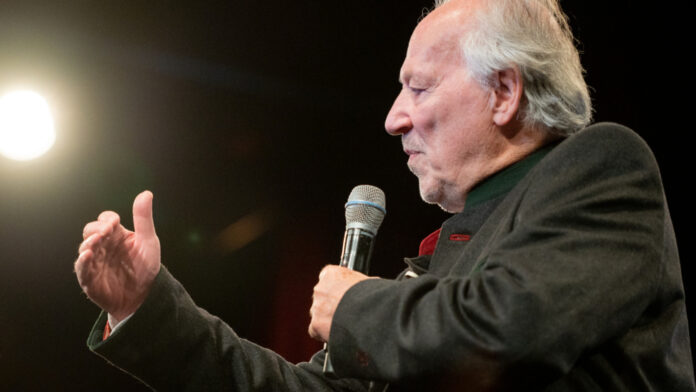The legendary filmmaker Werner Herzog turned 80 this year and was acknowledged at America’s largest documentary film festival DOC NYC 2022 with a Lifetime Achievement Award while also presenting two of his latest doc films, “Theatre of Thought” (2022) and “The Fire Within: A Requiem for Katia and Maurice Krafft” (2022).
Werner Herzog is a German filmmaker, documentarian, actor, author, screenwriter, poet and one of the greatest storytellers of our generation.
He is an enigmatic figure who refuses to conform to society’s modern-day norms; he avoids social media and self-promotion but is still revered as a pop culture icon.
Werner: “I don’t have a cell phone; I like to derive my nexus and my understanding of reality in a different way by, for example, traveling on foot or by reading … I mean reading books, not reading tweets. And understanding the landscape, not through a GPS system but by looking at the formation of a landscape and reading, reading the essence of it, so it’s a different way for me.
And the social media and algorithms that dominated … vile and debased and depraved, and we have to be very, very careful how we are handling it.”
A full-circle moment
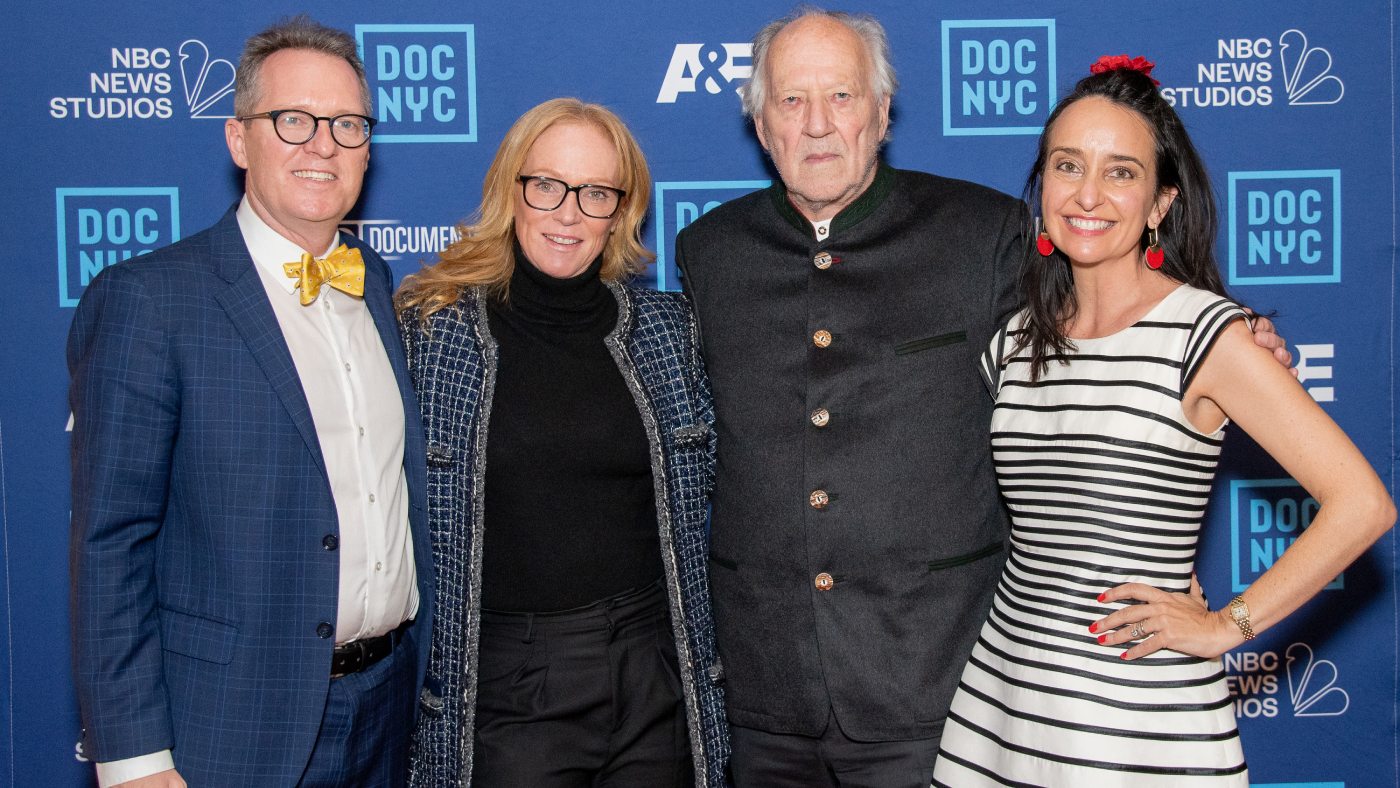
Herzog made his first film at the age of 19 in 1965 and since then has then produced, written or directed over sixty feature and documentary films, including “Grizzly Man” (2005) and classic feature films like “Aguirre, the Wrath of God” (1972)
It was a full circle moment for Herzog to be back at the DOC NYC festival in 2022, and we had the chance to learn more about his filmmaking process.
We also get insight from DOC NYC Executive Director Raphaela Neihausen and Director of Special Projects Thom Powers about how the festival has evolved over the years and their association with the German filmmaker Werner Herzog.
Raphaela: It’s very full circle; at our very first film festival, and our very first film on opening night, [it] was with Werner Herzog — “Cave of Forgotten Dreams” in 3D.
Thom: Yup, “Cave of Forgotten Dreams” in 2010 …
Raphaela: In a theatre, we had to build that day in 3D, which he (Herzog) loved. He said the projection was great for the record.
Raphaela: Yeah, so honoring Werner this year with a lifetime achievement award was very lovely because he really was at the very beginning of this whole process, and we’ve shown his films throughout the years, but finally, he said yes to being honored. He kind of shirked that for a while, but this year he accepted.
Thom: Well, it’s a special year to be honoring Herzog. He turned 80 in September. He had two new films this year, “The Fire Within” and “Theatre of Thought.” We got to show them both, so it was a great experience.
What is Werner Herzog working on currently?
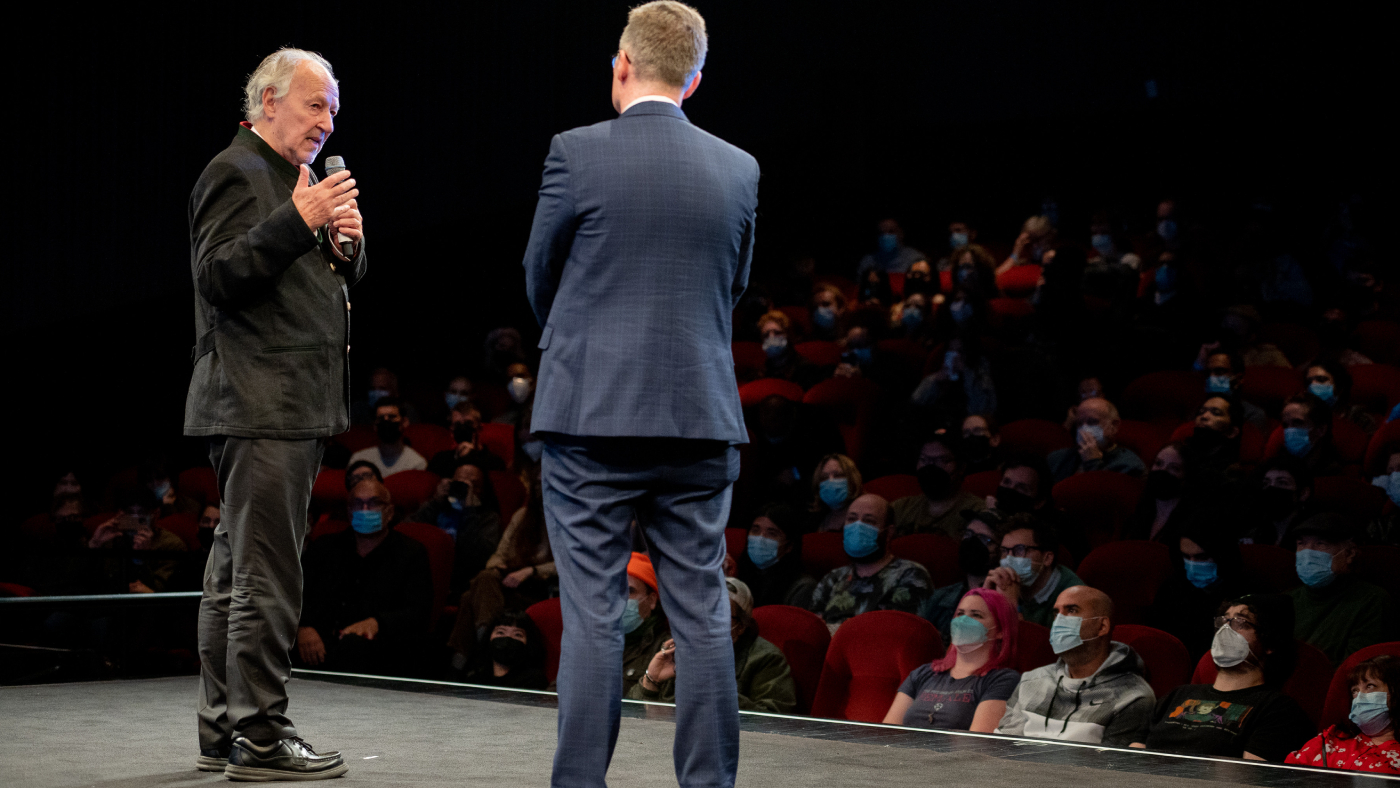
Herzog is as in demand as ever at age 80. At his DOC NYC screening for “Theatre of Thought,” he revealed that he has multiple projects in the works.
Werner: At the moment, I’m under some pressure because I have two new films, and two new books, and a film about me and a theatre performance.
Werner: It’s fun that I can do this, and I’ve been very, very lucky. I’m not compulsive, but if something comes with real vehemence. I have to take action. I can not duck in the trenches.
When asked about his unique interviewing technique by DOC NYC’s Thom Powers, Herzog was quick to shoot down the idea of interviewing subjects in his documentaries.
Werner: There are no interviews. No, no, that’s what journalists do. I’m a poet. That’s not funny; I am a poet.
Werner: And, of course, there are documentary films that are part of journalism, which is legitimate and okay, but I’ve been saying it for a long, long time, if you really want to go into something deeper — into something that illuminates you — that gives you an entrance into some deeper truth. You have to divorce yourself from journalism. You have to get away from journalism.
Be a poet, be somebody who’s just burning inside, so that’s what I do… There are no interviews, I had never written a catalogue of questions, it’s just my curiosity.
“Theatre of Thought”
Herzog is very well known for his colorful self-narrated documentaries, where his sharp wit and sense of humor combined with his poetic prose are hallmarks of his films.
In his new documentary “Theatre of Thought,” Herzog goes on a road trip to interview the top brain specialist around the country to figure out where thoughts and feelings come from within the brain. The film also examines the philosophical, ethical and social implications of new technology that can be adapted to the brain.
In the film, Herzog has a conversation with a brain scientist named Jamie and is asked about his poetic interviewing technique.
Thom: When you were having a poetic conversation with Jamie, you asked him about dancing with a hummingbird …”
Werner: Yes, and the answer was so instant, “yes, he says!”… And then he starts to think about dancing with a hummingbird and for a moment. I thought I should, what should I say next, and something shouted inside of myself, “shut up!” So I shut up and just waited and let Jaime dream about his dance with a hummingbird, and it’s one of my very, very favorite moments in the entire film just because I shut up and I had no further questions. So if you just let it happen.
Werner: And all of a sudden, you have a moment where you look deep into a soul, into the soul of a human being. In a short time, I think 7 to 8 minutes with Jamie Davies, and all of a sudden, you have the feeling, and you know you’re looking inside the heart of a man. And that’s what we should do. And we should not just have a checklist of questions; that’s why I’m so vehemently against the term interviews … that’s journalism.
The news tells us what happened, art explores what it means to be human. An important take away Herzog’s technique above is how to listen and empathize with the subject. For any documentary film to have success, there has to be compassion, and the filmmaker has to have an internal compass for when to ask the next question and when to refrain and let the subject explore the thought.
Establishing empathy is key to creating a connection with the audience and the film.
Becoming a documentary filmmaker
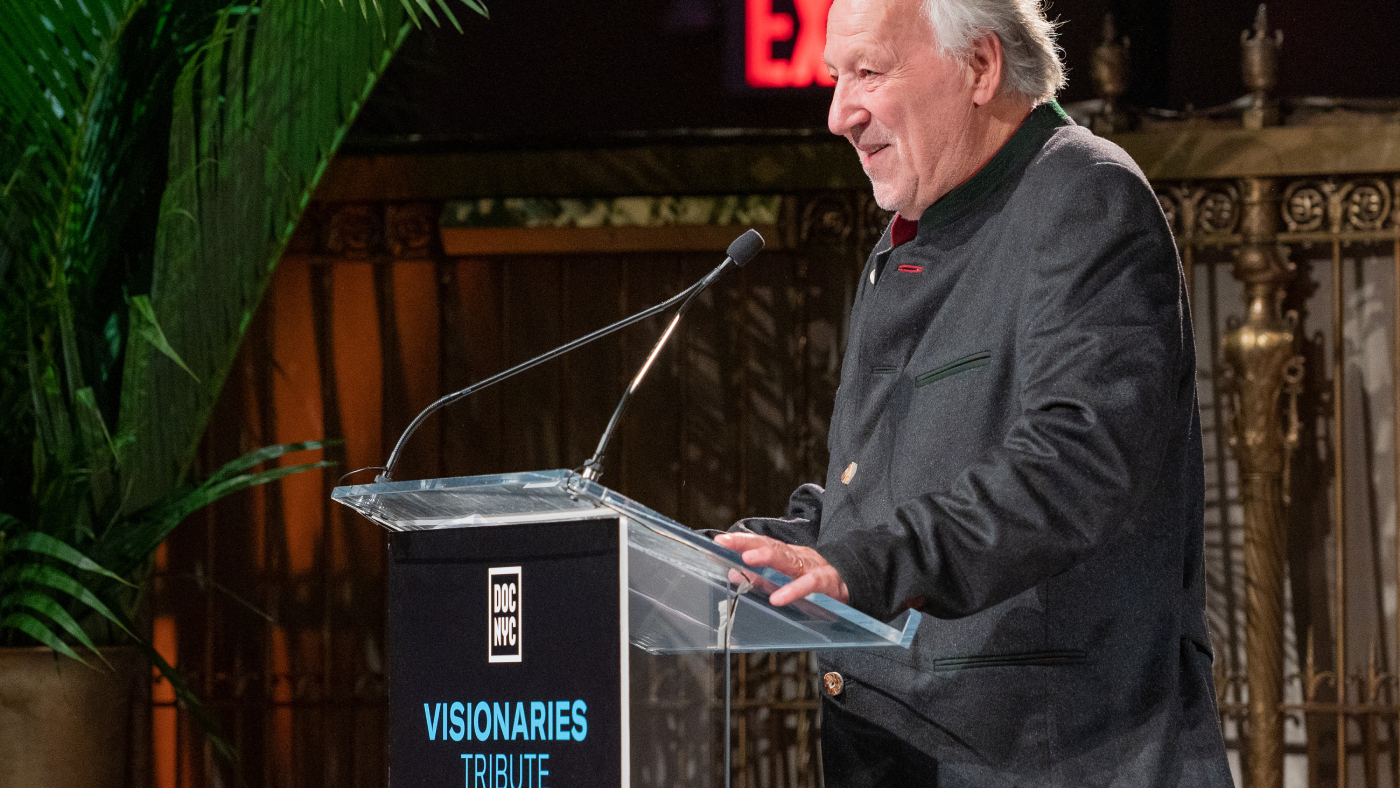
Here’s what DOC NYC directors Raphaela Neihausen and Thom Powers had to say about becoming a documentary filmmaker.
Raphaela: I’d say you really need to love this. Like, I don’t think if you love this, it’s not the right business for you. If you’re lucky enough, the financial side will pay off. It’ll all work out, but if that doesn’t pan out, you have to at least have the satisfaction of telling a story that only you could tell and that because of you, the world will know. So I really think that kind of passion and dedication, to me, is at the core of a decision to really be a documentary filmmaker.
Thom: I’d say that it’s important to have a good internal compass for understanding what it is you want to be doing in non-fiction storytelling because there are a lot of things that will try to throw you off your compass.
Raphaela: And the only thing I might add is that I think there isn’t one path to becoming a documentary filmmaker. You really have to figure out how to create the balance in your life that allows you to make the films you want to make.
Thom: I think some people have one film in them …
Raphaela: That’s okay too — that’s wonderful too …
Thom: And that’s, you know, great. Sometimes those are the most special films because you’re only doing it out of pure passion for a subject and not out of careerism … And some people are going to be lifers like Werner Herzog, who has made more than a film a year in his career.
Thom: The only book that I really put in the top of my list for my students’ collection of interviews conversations with Werner Herzog called “A Guide for the Perplexed,” almost every page of that book has something valuable to take away.
As a documentary filmmaker myself, I can attest to the importance of doing a documentary for the love of the art and not the financial benefits. It is just too difficult; otherwise, to complete a project, you must really love the medium.
Speaking with Werner Herzog: How to become a documentarian
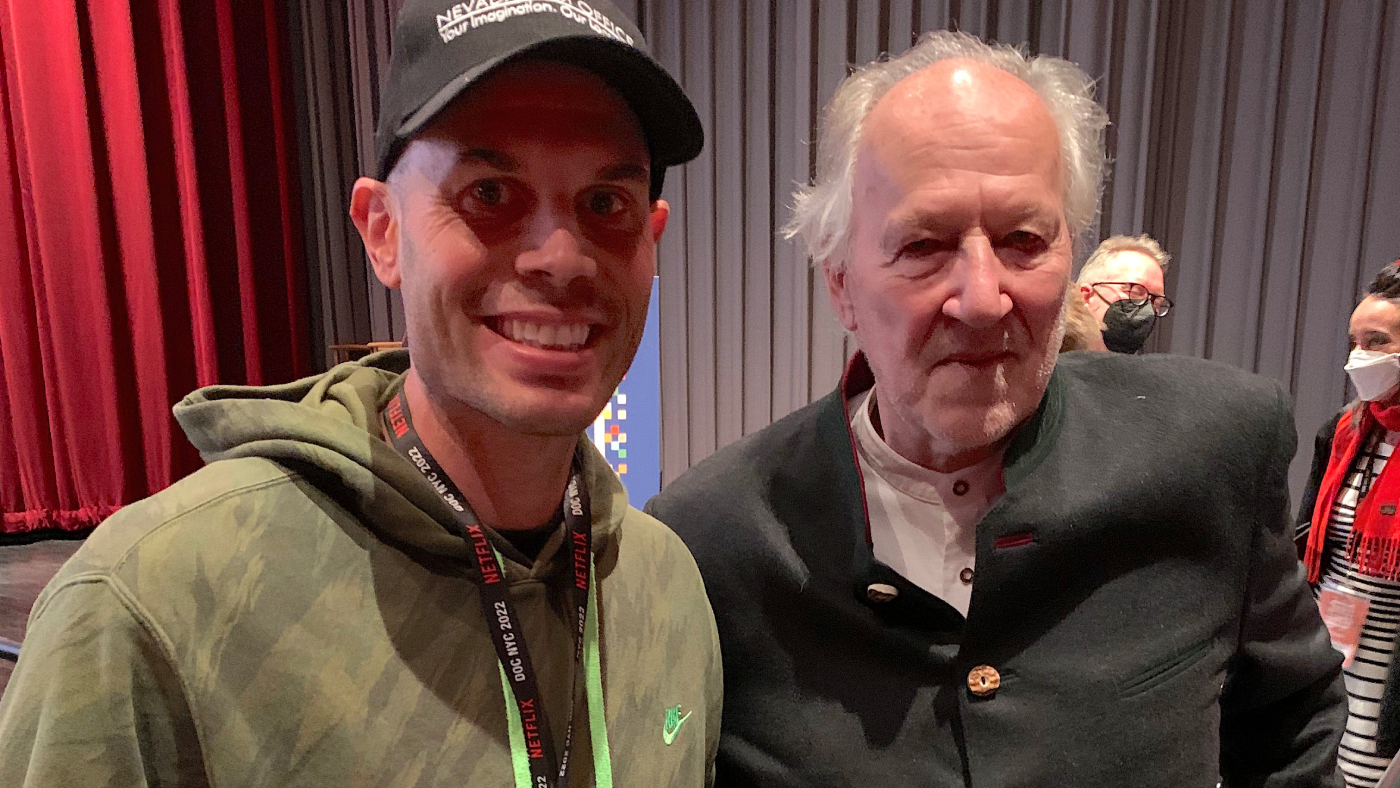
In November 2022, I was lucky enough to get invited back to DOC NYC for the second year in a row in for the “Industry Roundtables” Pitch Forum to pitch our upcoming doc. DOC NYC has created an ecosystem for all doc filmmakers and industry players to connect with each other and their audiences.
The festival is also a place where you might see Heather Graham present a film one day and Run DMC at a premiere the next day. Sam Waterson was spotted at a screening this year as well.
During my time at DOC NYC, I was fortunate enough to ask Werner Herzog some questions face-to-face about his key to success and longevity in filmmaking.
Me: How have you endured so long as a documentarian?
Werner: Well, it’s I’ve done work … I don’t know whether I make more feature films, I don’t even know … Well, I’ve been curious, that’s all.
When I asked Herzog about what tips he could share with inspiring documentarians, filmmakers or artists, he made it clear that the answer is not as simple as a bullet point.
Me: What would be your one tip as a filmmaker, artist, documentarian that you would pass on to anyone who gets to read this? Just one piece of information you can share?
Werner: Oh, for God’s sake, no, I can’t give it … It’s not as simple as that.
I think what Herzog is trying to say here is that documentary filmmaking is about the journey, not the destination, the curiosity to learn.
Werner: Go to the deepest level possible as quickly as possible. Take them to the highest level and do not allow them to come down. Just start the movie, no beating around the bush, dive deep into the heart and stay there.
Herzog’s philosophy is simple: go experience life for yourself. He believes the value in life’s most important lessons comes from experiencing life not through a screen but on foot in person.
Thom: What do you think the relationship between thinking and cinema is?
Werner: I think cinema itself is in a delicate relationship with ideas, almost a contrast. Ideas are normally not very good for movies. Movies are functioning differently and have their own dynamic, their own laws, their own storytelling, their own flow of consciousness.
Herzog’s new documentary about his life’s work is entitled “Werner Herzog: A Radical Dreamer” takes a more literal route to understanding his life’s work. The film is directed by another German filmmaker Thomas Von Steinaecker. And Herzog’s new memoir entitled “Every Man for Himself and God Against All” is already available in his home country of Germany and will soon be translated and available in the US in 2023.
Werner: Well, it’s not an autobiography; it’s some sort of — how can I say — origins of ideas, for example, and then all of a sudden, there is poetry in it …
Herzog’s memoir
Herzog’s memoir describes in his own words his meager upbringing on a remote mountain farm in Balvaria, where he was forced to move as a young child when his house got bombed in World War Two, but Herzog’s curiosity for life led him to a life of fame of and success as a filmmaker, writer and poet.
Herzog once said, “Get used to the bear behind you.”
His cinema vérité style of filmmaking is always in search of the essential truth. His innate curiosity keeps him going even at the age of 80. From mountain farm to DOC NYC, Werner Herzog has influenced countless filmmakers, including myself, with his epic journies to the far edges of the earth. Curiosity may have killed the cat, but not Herzog, who clearly has more than nine lives.

